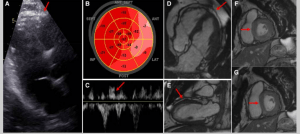The intricate relationship between inflammation and heart disease has been increasingly recognized in recent years, with inflammation playing a pivotal role in both the onset and progression of various cardiovascular diseases. Inflammatory processes can either arise from acute cardiac events, such as a myocardial infarction, or manifest chronically in conditions like atherosclerosis, which is driven by persistent low-grade inflammation. The involvement of the immune system in heart disease has led to the development of new terms, such as cardio-immunology and cardior-rheumatology, highlighting the intersection of immunology, cardiology, and rheumatology.

Figure 1: Fifty-five-year-old female with long-standing SLE presenting with acute shortness of breath. (A) Parasternal 2D echocardiographic long-axis image shows increased echogenicity and thickening of the anterior pericardium. (B) LV global longitudinal strain demonstrates reduced strain of the basal anterior and lateral wall segments, a pattern seen in constrictive pericarditis. (C) Systolic flow reversal is noted in the hepatic vein Doppler signal consistent with elevated right ventricular end-diastolic pressure. (D) The transaxial four-chamber image and (E). transaxial longitudinal view demonstrated dense calcification and thickening of the anterior pericardium extending to the left ventricular apex. Paradoxical septal motion is noted from the short-axis CMR images in systole (F) and diastole (G), suggestive of interventricular dependency and constrictive physiology.
The immune system’s role in cardiovascular diseases is multifaceted. In cases like postviral myocarditis and pericarditis, an initial viral infection or molecular mimicry can trigger an ongoing immune response, leading to chronic inflammation in the heart muscle or pericardium. Systemic autoimmune diseases such as systemic lupus erythematosus (SLE) also pose significant risks to cardiovascular health. In these patients, inflammation not only targets the cardiovascular system directly but also complicates treatment. For instance, therapies like prednisone, commonly used to manage autoimmune diseases, carry their own cardiovascular risks.
Emerging treatments in cardiology aim to modulate the immune response to reduce inflammation and prevent heart damage. Interleukin-1 (IL-1) blockers, for example, are being explored for their potential to alleviate chronic conditions like recurrent pericarditis. The use of colchicine and other anti-inflammatory medications has shown promise in clinical trials, reducing cardiovascular events in patients with atherosclerosis. However, challenges remain, particularly in understanding which patients will benefit most from these therapies. Ongoing research in the fields of cardio[immunology and cardio rheumatology is essential to better understand the mechanisms linking inflammation and heart disease and to develop more targeted treatments.
Journal article: Weber, Brittany N, et al. Acute Cardiovascular Complications of Immune-Mediated Systemic Inflammatory Diseases. European Heart Journal.
Summary by Faith Oluwamakinde










